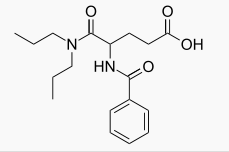Proglumide
 | |
| Identifiers | |
|---|---|
| |
| CAS Number | |
| PubChem CID | |
| E number | {{#property:P628}} |
| ECHA InfoCard | {{#property:P2566}}Lua error in Module:EditAtWikidata at line 36: attempt to index field 'wikibase' (a nil value). |
| Chemical and physical data | |
| Formula | C18H26N2O4 |
| Molar mass | 334.41 g/mol |
|
WikiDoc Resources for Proglumide |
|
Articles |
|---|
|
Most recent articles on Proglumide |
|
Media |
|
Evidence Based Medicine |
|
Clinical Trials |
|
Ongoing Trials on Proglumide at Clinical Trials.gov Clinical Trials on Proglumide at Google
|
|
Guidelines / Policies / Govt |
|
US National Guidelines Clearinghouse on Proglumide
|
|
Books |
|
News |
|
Commentary |
|
Definitions |
|
Patient Resources / Community |
|
Patient resources on Proglumide Discussion groups on Proglumide Patient Handouts on Proglumide Directions to Hospitals Treating Proglumide Risk calculators and risk factors for Proglumide
|
|
Healthcare Provider Resources |
|
Causes & Risk Factors for Proglumide |
|
Continuing Medical Education (CME) |
|
International |
|
|
|
Business |
|
Experimental / Informatics |
Editor-In-Chief: C. Michael Gibson, M.S., M.D. [1]
Overview
Proglumide (Milid) is a drug which inhibits gastrointestinal motility and reduces gastric secretions.
Proglumide acts as a cholecystokinin antagonist.[1] It was used mainly in the treatment of stomach ulcers,[2][3] although it has now been largely replaced by newer drugs for this application.
An interesting side effect of proglumide is that it enhances the analgesia produced by opioid drugs,[4] and can prevent or even reverse the development of tolerance to opioid drugs.[5][6] This can make it a useful adjuvant treatment to use alongside opioid drugs in the treatment of chronic pain conditions such as cancer, where opioid analgesics may be required for long periods and development of tolerance reduces clinical efficacy of these drugs.[7][8]
See also
References
- ↑ Bunney BS, Chiodo LA, Freeman AS. Further studies on the specificity of proglumide as a selective cholecystokinin antagonist in the central nervous system. Annals of the New York Acadamy of Sciences. 1985;448:345-51.
- ↑ Bergemann W, Consentius K, Braun HE, Hirschmann H, Marowski B, Munck A, Rehs HU, Stopik D, Wilke G. Duodenal ulcer - multicenter double-blind study with proglumide. (German) Medizinische Klinik. 1981 Apr 10;76(8):226-9.
- ↑ Tariq M, Parmar NS, Ageel AM. Gastric and duodenal antiulcer and cytoprotective effects of proglumide in rats. Journal of Pharmacology and Experimental Therapeutics. 1987 May;241(2):602-7.
- ↑ McCleane GJ. The cholecystokinin antagonist proglumide enhances the analgesic effect of dihydrocodeine. Clinical Journal of Pain. 2003 May-Jun;19(3):200-1.
- ↑ Watkins LR, Kinscheck IB, Mayer DJ. Potentiation of opiate analgesia and apparent reversal of morphine tolerance by proglumide. Science. 1984 Apr 27;224(4647):395-6.
- ↑ Tang J, Chou J, Iadarola M, Yang HY, Costa E. Proglumide prevents and curtails acute tolerance to morphine in rats. Neuropharmacology. 1984 Jun;23(6):715-8.
- ↑ Bernstein ZP, Yucht S, Battista E, Lema M, Spaulding MB. Proglumide as a morphine adjunct in cancer pain management. Journal of Pain and Symptom Management. 1998 May;15(5):314-20.
- ↑ McCleane GJ. The cholecystokinin antagonist proglumide enhances the analgesic efficacy of morphine in humans with chronic benign pain. Anesthesia and Analgesia. 1998 Nov;87(5):1117-20.
- Pages with script errors
- E number from Wikidata
- ECHA InfoCard ID from Wikidata
- Articles without EBI source
- Chemical pages without ChemSpiderID
- Chemical pages without DrugBank identifier
- Articles without KEGG source
- Articles without InChI source
- Articles without UNII source
- Drugs missing an ATC code
- Drugs with no legal status
- Articles containing unverified chemical infoboxes
- Drug